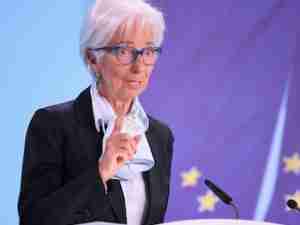The European Union rebuffed the U.K.’s call to reset the two sides’ relationship, saying Britain needs to honor the promises it made on Northern Ireland as part of the Brexit deal.
In a letter to Cabinet Office Minister Michael Gove, European Commission Vice-President Maros Sefcovic gave a cool response to Britain’s request to delay the implementation of border checks on some goods entering the province, saying that measures the U.K. previously signed up to “urgently need to be fully and faithfully implemented.”
The letter, published ahead of a meeting between the two men in London on Thursday, is likely to inflame tensions between the two sides that escalated dramatically on Jan. 29 when the commission briefly threatened to trigger an emergency clause in the Brexit divorce deal to curb vaccine exports to Northern Ireland.
Speaking to lawmakers Tuesday, Gove said the part of the Brexit deal covering Northern Ireland wasn’t working, and called for a reset in the EU’s relationship with Britain.
Johnson Concession
Unlike the rest of the U.K., Northern Ireland effectively remained in the EU’s customs union and single market after Brexit—a concession Prime Minister Boris Johnson made to the bloc in order to secure Britain’s orderly departure.
With goods crossing the Irish Sea facing delays and disruption, Gove is seeking to postpone the introduction of full checks on food destined for supermarkets, medicines and parcels moving into the province from the rest of the U.K. until 2023.
But “blanket derogations” from EU law as set out in the deal “in respect of Northern Ireland cannot be agreed beyond what the Protocol foresees already,” Sefcovic said in the letter.
He also said granting more flexibility around checks on seeds and pets crossing the border—two British demands—“would entail the U.K. committing to align with the relevant EU rules.”
Sefcovic also set out a list of what he called “shortcomings” in the British implementation of the deal, saying border control posts are still not fully operational and data-sharing aren’t in place.
The U.K.’s Cabinet Office criticized Sefcovic’s letter and called for urgent action to “restore confidence” in the Northern Ireland protocol.
“It is disappointing that the Commission has failed to acknowledge the shock and anger felt right across the community in Northern Ireland from its decision to trigger Article 16,” the Cabinet Office said in a statement. Gove will underline the need for “political leadership” when he meets with Sefcovic on Thursday, the statement said.
The letter also drew a critical response from Northern Ireland’s first minister, Arlene Foster, whose Democratic Unionist Party has long opposed the protocol.
She said that Sefcovic has had his “head in the sand” and “fingers in his ears” over the problems affecting the region. “That’s an incredible state of affairs,” she told on ITV’s “Peston” program on Wednesday.
Irish Prime Minister Micheal Martin called on EU member states to “cool it,” saying there were bound to be teething problems in early days of the protocol.
“Tensions were rising unnecessarily,” he told RTE Radio on Thursday. “Ultimately, we want the U.K. aligning well with the EU. We want harmonious sensible relationships.”
Separately, the European Commission said Wednesday that it wanted to delay the conclusion of the provisional application of the wider post-Brexit trade agreement from the end of February until April 30 to give time for governments and EU lawmakers to scrutinize the trade pact.
The European Parliament has to vote on whether to approve the deal before the end of the provisional period. Officials on both sides said it’s highly unlikely lawmakers will seek to vote down the accord. Any delay, though, would still have to be approved by both the U.K. and EU.
“It’s a little surprising the EU wish to change it quite so soon,” David Frost, the U.K.’s chief Brexit negotiator, said to a panel of lawmakers Tuesday after being told informally by the EU that it wanted more time. Frost said he didn’t think there is “any wish” on the U.K. side “to extend this more than necessary.”






